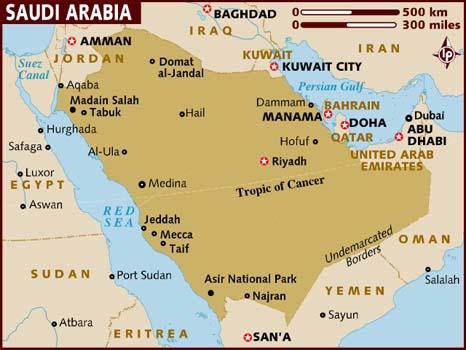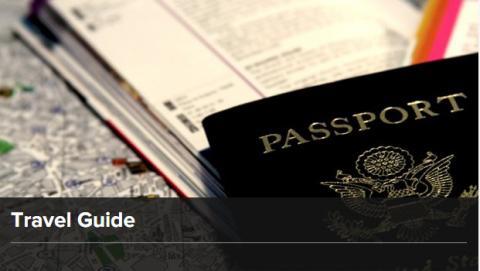
Compliance and Financial Considerations
If you intend to do any of the following in Saudi Arabia, please contact Risk Services at risk@berkeley.edu(link sends e-mail)or 642-5141:
- Hire a local to work for you as an employee
- Purchase or lease office or research space
- Purchase or lease an automobile
- Establish a long-term (over 90 days) or ongoing project
- Conduct a clinical trial
U.S. GOVERNMENT COMPLIANCE CONSIDERATIONS
Foreign activities may trigger many U.S. laws, including:
- Import Controls
- Export Controls
- Tax Reporting
- Foreign Bank Account Reporting
- Country Embargoes and Targeted Sanctions
- Foreign Corrupt Practices Act
- Anti-Boycott Laws
Import Controls. UC employees must adhere to U.S. import requirements, and may need to enlist the services of a customs broker, especially for shipments arriving by sea and subject to the Importer Security Filing 71730(link is external), also known as ISF 10+2.
Export Controls. Export controls may apply to advanced software and technology, research data, and other sensitive assets. UC’s Export Compliance FAQ contains useful information and can be found here(link is external). Go here(link is external) for the University of California plan for compliance with federal export controls. If you plan on taking or sending potentially export-controlled materials to Cuba, consult the campus Research Administration Compliance Office(link is external) at 642-0120.
Tax Reporting. The University and its employees may be taxed in foreign countries. The United States does not have a tax treaty with Saudi Arabia. For more information about double taxation issues, contact the Controller’s Office at:
- gao@berkeley.edu(link sends e-mail) or 642-0031 for tax advising and unrelated business income tax coordination, or
- payhelp@berkeley.edu(link sends e-mail) or 642-1336 for foreign tax form processing
Foreign Bank Account Reporting. The U.S. Treasury Department requires U.S. citizens with a financial interest in or signatory authority over a financial account in a foreign country, where accounts exceed $10,000 at any point during a calendar year, to report such accounts on a Report of Foreign Bank and Financial Accounts(link is external) (FinCen Report 114(link is external)). Those needing to complete the form should contact the Controller’s Office at cashiers@berkeley.edu(link sends e-mail) or 643-9803 for assistance. An IRS 1040 Schedule B form (Part III–Foreign Accounts and Trusts) must be filed by the signatory for any foreign bank account, regardless of the account balance.
Country Embargoes and Targeted Sanctions. In general, collaborations between University personnel and scholars at foreign institutions or organizations do not require export licenses unless they involve export-controlled or -restricted research or involve scholars in sanctioned countries. Before engaging in an international collaboration, the University needs to determine whether export licenses are required and to verify that the foreign collaborator is not blocked or sanctioned. The Office of Foreign Assets Control(link is external)(OFAC) is responsible for enforcing all U.S. embargoes and sanctions. Depending on each country’s embargo or sanction program, activities may be prohibited without specific authorization or license. UC’s International Collaborations(link is external)webpage contains additional information on this topic.
The Foreign Corrupt Practices Act (FCPA) is intended to stop bribery. It prohibits offering to pay, paying, promising to pay, or authorizing the payment of money or anything of value to a foreign official. The term “foreign official” generally includes any employee or contractor of a foreign government, and may include individuals employed by foreign universities. It is also unlawful to make a payment to a third party knowing that all or part of the payment will go to a foreign official. For more information, review the federal government’s Resource Guide to the U.S. Foreign Corrupt Practices Act.(link is external) If you need further clarification, contact the UC Berkeley Office of Legal Affairs(link is external) at 642-7122. Transparency International’s 2018 survey of perceived public sector corruption rated Saudi Arabia at 49 out of 100 (58th out of 180 countries reviewed, i.e. somewhat corrupt).
Anti-Boycott Laws. The U.S. Department of Commerce(link is external) is responsible for oversight of laws prohibiting individuals and entities from participating in boycotts not approved or sanctioned by the U.S. government. The Export Administration Act(link is external) requires that requests to participate in such boycotts or to conduct activities in any of the boycotting countries be formally reported to the Department of Commerce and/or IRS.
For other compliance-related issues, refer to UC’s International Compliance(link is external) webpage.
ADDITIONAL CONSIDERATIONS FOR DOING BUSINESS INTERNATIONALLY
Foreign Bank Accounts. Employees wishing to open a foreign bank account should contact the Controller’s Office at cashiers@berkeley.edu(link sends e-mail) or 643-9803. Requests to open accounts must be made through the Office of the President’s Banking and Treasury Services Group(link is external) by the Chancellor or the Chancellor’s designee.
Real Estate Agreements. Only employees with delegated authority to sign contracts on behalf of The Regents may enter into agreements, leases, or other contracts. Foreign affiliates or operations must submit to the Real Estate Services Office(link sends e-mail)property management agreements, personal property leases, or contracts with a term longer than one year or in an amount greater than $25,000 per year. The campus then seeks approval from the University president or designee. For more information, consult the Guidelines for the Establishment and Operation of Foreign Affiliate Organizations and Foreign Operations.
Articles

Personal Safety
AUTHORITIES IN SAUDI ARABIA SUSPENDED AIR TRAVEL WITH INDIA, BRAZIL AND ARGENTINA FROM SEPTEMBER 23 DUE TO INCREASED CORONAVIRUS DISEASE (COVID-19) ACTIVITY IN THOSE COUNTRIES. AUTHORITIES PARTIALLY LIFTED RESTRICTIONS ON INTERNATIONAL TRAVEL SEPTEMBER 15. ALL TRAVELERS MUST PROVIDE PROOF OF HAVING TESTED NEGATIVE FOR COVID-19 WITHIN 72 HOURS OF THEIR ARRIVAL; NON-SAUDI NATIONALS WILL NOT BE PERMITTED ENTRY IF THEY FAIL TO PROVIDE THEIR RESULTS. UPON ARRIVAL, TRAVELERS WILL BE TESTED FOR COVID-19 AND MUST PRESENT A COMPLETE HEALTH DISCLAIMER FORM TO AUTHORITIES. ARRIVALS WILL BE SUBJECT TO A THREE DAY QUARANTINE AND SHOULD UNDERGO ANOTHER COVID-19 TEST 48 HOURS AFTER ENTERING THE COUNTRY. IF TRAVELERS DO NOT TAKE A SECOND COVID-19 TEST, THE QUARANTINE PERIOD WILL CONTINUE FOR SEVEN DAYS. ARRIVALS MUST DOWNLOAD AND REGISTER ON THE "TATMAN" AND "TAWAKKALNA" APPLICATONS. AUTHORITIES COULD REINTRODUCE RESTRICTIVE MEASURES RELATING TO THE COVID-19 PANDEMIC IF THERE IS A SIGNIFICANT INCREASE IN CASES; SUCH MEASURES COULD BE AMBIGUOUS AND OCCASIONALLY CONTRADICTORY.
THE U.S. STATE DEPARTMENT ISSUED A TRAVEL ADVISORY (updated January 10, 2018) ASKING TRAVELERS TO EXERCISE INCREASED CAUTION IN SAUDI ARABIA DUE TO TERRORISM AND THE THREAT OF MISSILE ATTACKS ON CIVILIAN TARGETS. TRAVELERS TO SAUDI ARABIA SHOULD READ THE ENTIRE TRAVEL WARNING BEFORE DEPARTURE AND TAKE APPROPRIATE STEPS TO ASSURE THEIR PERSONAL SAFETY.
Note: this page contains basic risk information. For more details, please contact the Risk Services Office at risk@berkeley.edu(link sends e-mail)(link sends e-mail)(link sends e-mail)(link sends e-mail).
Because everyone’s health is unique, we suggest seeking the advice of a medical professional before traveling internationally. Members of the campus community interested in protecting their health while abroad may schedule an appointment with the University Health Services International Travel Clinic(link is external)(link is external)(link is external)(link is external).
Legal/Political
Dual Citizenship: Saudi Arabia generally does not recognize dual nationality. Saudi law requires Saudi citizens to obtain official permission from the government before obtaining a second nationality. At times, Saudi authorities have confiscated the passports of U.S. citizens applying for Saudi citizenship. This does not constitute loss of U.S. citizenship. If this happens to you or someone you know, report the incident to the U.S. Embassy.
Arrest Notification: If you are arrested or detained, ask police or prison officials to notify the U.S. Embassy or consulate immediately. Be aware that Saudi Arabia generally restricts consular notification of the arrest of foreigners to the Embassy of the country that issued the travel document used to enter the Kingdom. If you enter Saudi Arabia with a Saudi travel document, or with the passport of a country other than the United States, it will be extremely difficult for the U.S. Embassy to provide consular services if you are subsequently detained. Persons detained in Saudi Arabia may be held without charges for lengthy periods and denied access to counsel; dual citizens may not have consular assistance.
Drones: The importation of drones for commercial or personal use is prohibited without prior approval from the General Authority for Civil Aviation (GACA). A customs clearance certificate authorizing importation can be obtained as part of the GACA approval process. Visit GACA’s website for further information.
Criminal Penalties: While in Saudi Arabia, you are subject to local laws. If you violate Saudi laws, even unknowingly, you may be expelled; arrested; imprisoned; held without trial for lengthy periods of time; interrogated without counsel; subject to corporal punishments, including lashings; or executed.
Penalties for the import, manufacture, possession, and consumption of alcohol or illegal drugs in Saudi Arabia are severe. Convicted offenders can expect long jail sentences, heavy fines, public floggings, and deportation. The penalty for drug trafficking is death. Furthermore, some laws are prosecutable in the United States regardless of local law.
There are substantial limitations on freedom of speech and political expression in Saudi Arabia.
LGBTI Travelers: Same-sex sexual relations, even when consensual, are criminalized in Saudi Arabia. Violations of Saudi laws governing perceived expressions of, or support for, same-sex sexual relations, including on social media, may be subject to severe punishment. Potential penalties include fines, jail time, or death.

